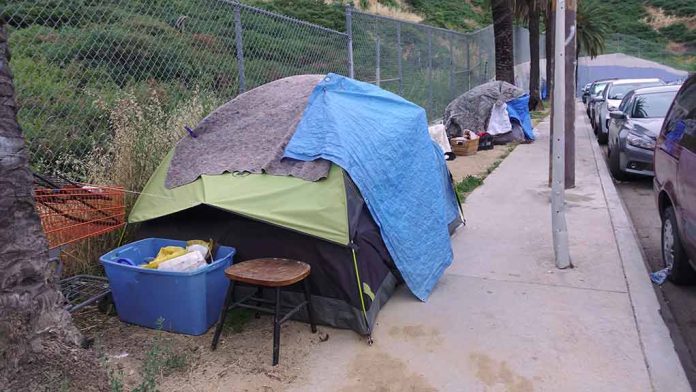
A new lawsuit challenges Grants Pass, Oregon’s camping ordinance, reigniting the debate over homeless rights and city policies.
Top Takeaways
- Disability Rights Oregon is suing Grants Pass over its public camping policies following a Supreme Court ruling.
- The lawsuit claims the city’s policies discriminate against disabled homeless individuals, violating state law.
- Grants Pass closed its larger campsite and restricted the smaller one, citing unsanitary conditions.
- The legal action seeks to reverse the campsite closure and halt restrictions on the remaining site.
- This case highlights the ongoing national struggle to balance city ordinances with the needs of the homeless population.
Supreme Court Ruling and New Legal Challenge
In June 2024, the U.S. Supreme Court upheld a Grants Pass ordinance banning public camping, rejecting claims that it violated the Eighth Amendment’s prohibition on cruel and unusual punishment. This decision was seen as a victory for cities grappling with homelessness issues. However, the city now faces a new legal challenge from Disability Rights Oregon and five disabled homeless individuals.
The lawsuit, filed in the Circuit Court for the State of Oregon for Josephine County, argues that the city’s policies discriminate against disabled people, violating Oregon state law. The plaintiffs claim that the available camping spaces are insufficient and unsuitable for individuals with disabilities, particularly those using mobility devices.
Campsite Closures and Restrictions
The Grants Pass City Council recently voted to close the larger of two city-owned campsites for homeless individuals and restrict the use of the smaller one. City officials cited unsanitary conditions as the reason for these actions. However, this decision has left many homeless residents, especially those with disabilities, in a precarious situation.
“A lot of us do not have any idea where to go,” said Janine Harris, a 57 year-old woman who became homeless four years ago.
The lawsuit seeks a temporary restraining order to reverse the closure of the larger campsite and halt restrictions on the smaller one. According to the complaint, the available camping space accommodates less than 20% of the homeless population in Grants Pass, exacerbating the already dire situation for those without shelter.
Accusations of Criminalizing Homelessness
Critics argue that Grants Pass is using its authority to criminalize homelessness under the guise of time, place, and manner restrictions. The lawsuit claims that the city lacks a meaningful plan to provide shelter or assist homeless individuals in finding housing, particularly those with disabilities.
“Putting the lives of people with disabilities at risk in the dead of winter because they don’t have housing is cruel and illegal,” said Jake Cornett, the executive director and CEO of Disability Rights Oregon. “Without adequate shelter space available, forcing a person in a wheelchair or someone with a chronic illness to pack and move their belongings daily is not just impossible, it’s inhumane. Grants Pass’s dangerous actions must be stopped.”
Broader Context of Homelessness Crisis
The Grants Pass case is part of a larger national conversation about homelessness and affordable housing. Last year, the United States saw an 18% increase in homelessness, driven by a variety of factors such as a lack of affordable housing, natural disasters, and increased migration. Cities across the country are struggling to address this growing crisis while maintaining public order and safety. As this legal battle unfolds, it will likely have implications for how other cities approach their homeless populations, particularly in light of the recent Supreme Court ruling.






















